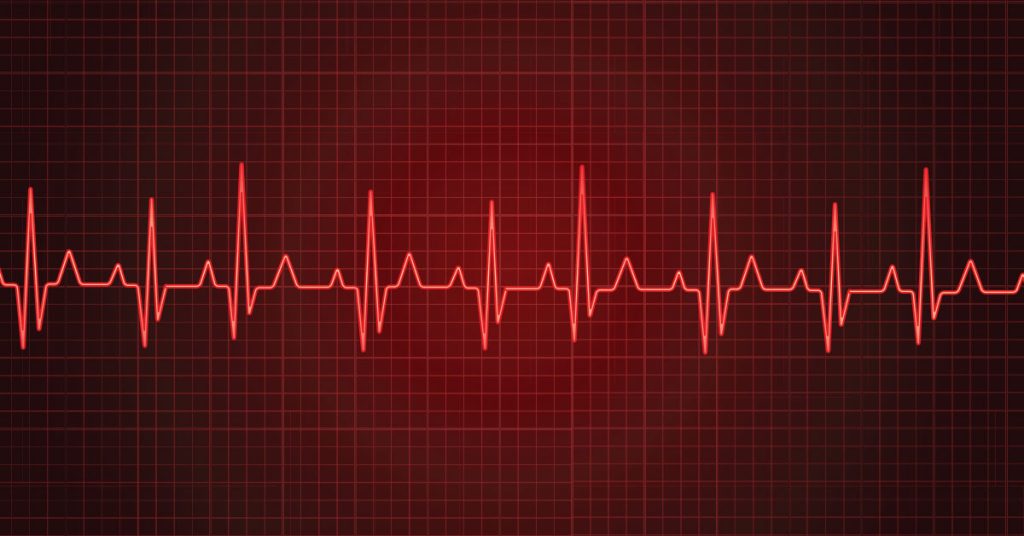The heart beats at a rate of 60 to 100 beats a minute, 48000 times an hour, 100000 times a day, and more than 2.5 billion times in a lifetime. Sometimes, the heartbeat becomes abnormal; it becomes too fast, too slow, or irregular. At times, this situation is normal and could be because you are flushed, stressed out, or have high amounts of caffeine or nicotine in your blood. However, sometimes, an irregular heartbeat may be lethal to health.
Should you be worried about an irregular heartbeat? Let us find out.
Table of Contents
ToggleIrregular Heartbeats
The condition where a person experiences an irregular heartbeat is also known as heart arrhythmia. The thing about arrhythmias is that even though they will not do much harm under normal circumstances, they can be extremely dangerous sometimes.
The sinoatrial (SA) node in your heart generates the impulse or signal that makes the heart contract and starts a heartbeat. Under normal circumstances, the rate is 60 to 100 impulses a minute, and since the SA node sets a pace, it is also known as the pacemaker. An irregular heartbeat occurs when the impulse does not work as it should. Basically, the electrical activity in your heart becomes abnormal because of some defect in the pacemaker.
Types of Arrhythmias
The average speed for the heart rate during rest is 60 to 100 beats a minute. Anything lower or higher than that means that you have an irregular heartbeat. Tachycardia is an irregular heartbeat higher than 100, while bradycardia is a slow heartbeat lesser than 60.
Causes of an Irregular Heartbeat

There are many reasons why a person experiences an irregular heartbeat. Some of them include:
- A defected heart at birth
- A family history of arrhythmias
- Smoking excessively
- Being overweight
- High blood pressure
- Aging
- Drinking excessively
At times, other diseases in the body weaken the heart and may lead to arrhythmia. That usually occurs in older people as their immune system weakens with age.
Diagnosis
An irregular heartbeat reported by the patient is a diagnostic measure in itself. Doctors can further confirm it by taking an ECG (electrocardiogram) which records the exact rhythm of your heart. If the ECG does not show results, the doctors might ask the patient to wear a Holter monitor.
Symptoms
The most common symptom of arrhythmias is an irregular heartbeat. These can be better described as heart palpitations, in which you might feel as if your heart is racing, fluttering, or slowing down. Patients have described their hearts pounding, flopping, and skipping.
You might experience the following symptoms too:
- Feeling dizzy or lightheaded
- Fainting
- Shortness of breath
- Feeling anxious
- Sweating
- Chest pains
- Tiredness
Some people experience no symptoms of arrhythmia and find out about it when diagnosed with another condition.
When Should I Be Worried About An Irregular Heartbeat?
If you are worried if you should go to a doctor or not, keep these things in mind:
Some Arrhythmias Are Just Heart Palpitations and Nothing More
It is true. For example, your heart starts to race because you have consumed a lot of caffeine, or your heart pumps faster because you are angry or nervous. That is normal and nothing to worry about.
However, if you have had a heart problem and your heartbeat becomes irregular, then a check-up is not a bad idea. If you feel your heartbeat becomes abnormal for long periods, get yourself checked too.
Some Types of Arrhythmias Need Regular Monitoring
Tachycardia and bradycardia are two conditions of an irregular heartbeat you should not leave unmonitored.
What Happens in Bradycardia and Tachycardia?
The cause of a slow or fastened heartbeat may be a damaged sinoatrial node. Since the SA node is the pacemaker in the heart, scarring in the tissue may lead to disrupted or irregular signals to your heart. It could also be because of an electrical block on the pathway that the electrical impulse of the SA node follows. Since the generated impulse becomes irregular, the heartbeat becomes irregular too.
Treatment
If the arrhythmia is a severe one, doctors might assign medicine. They may assign:
- Cardiac ablation: a procedure in which any scarred heart tissue gets removed.
- The doctor might install a pacemaker to fix an irregular heartbeat.
- Implanting a defibrillator is another option. A defibrillator returns the heart to a regular rhythm after a shock.
An overall change in lifestyle can do wonders. For example, you should:
- Lose weight
- Have a controlled alcohol intake
- Sleep regularly
- Exercise
Sometimes an arrhythmia is lethal, so you should go to the doctor as soon as possible.
There are many such arrhythmias:
Atrial Fibrillation or AFib
In this condition, the heartbeat becomes irregular because of a chaotic heart signal. An episode of A-fib is temporary, but if left untreated, it can worsen and eventually result in a stroke. It is more common in older men, and people experiencing it usually have other heart issues too.
Ventricular Fibrillation or Vfib
In normal conditions, the ventricles in the lower chamber of the heart contract and pump blood to the heart. However, during ventricular fibrillation, chaotic electrical impulses cause the ventricles in the heart to quake instead of contract. It may lead the person to cardiac arrest and death, so it is best if such an arrhythmia receives treatment immediately.
An implanted cardioverter defibrillator (ICD) in the body helps restore the heartbeat to normal. Sometimes, doctors install the device even if you have never had a case of Vfib to nullify the chances of any occurring in the future. That has also proven to prolong life. Usually, Vfib occurs in people with existing heart disease, and if you have had a heart condition in the past, like a heart attack, failure, or a cardiac arrest, it is best to consider an ICD.
Ventricular Tachycardia, or VT
In this condition, rapid electrical impulses to the heart do not allow the ventricles to fill up with blood. Unlike Vfib, this condition is not lethal under normal circumstances. It does not last long, and you do not need to go to a doctor. But sometimes, it persists and may lead to a cardiac arrest.
Treatment for VT may be in the form of:
- ICD, to prevent another similar event,
- Ablation procedures or
- Medication
How Long Can You Live With An Irregular Heartbeat?
There is no specific answer on how long you may survive with an irregular heartbeat. Depending on the irregularity of your heartbeat, your age, and the history of diseases in your body, a doctor may be able to help you out on this matter further and assign you the required treatment.
Should I Rush To The Doctor?
If you are thinking about when you should get worried about an irregular heartbeat, look for the symptoms. If you have a history of heart conditions or the arrhythmia persists, you should probably go to the doctor. The team at HG Analytics is well-trained and has the required equipment to help you diagnose arrhythmia. It is never too late. An ICD installed right now may prolong your life, so you should not be careless about any harmful changes in your body.





